The global sales of Distributed Antenna Systems (DAS) are estimated to be worth USD 4,651.38 million in 2025 and anticipated to reach a value of USD 9,047.85 million by 2035. Sales are projected to rise at a CAGR of 7.7% over the forecast period between 2025 and 2035. The revenue generated by Distributed Antenna Systems (DAS) in 2024 was USD 4,318.83 million. The market is anticipated to exhibit a Y-o-Y growth of 6.7% in 2025.
A Distributed Antenna System (DAS) is an essential solution for improving cellular network coverage in densely populated areas. It works by connecting a single signal source to a network of strategically positioned antennas that distribute the signal across specific environments.
DAS is mostly installed in the most densely crowded places, that is, megastructures, hypermarkets, big stadiums, administrative centers, industrial enterprises, as well as just recently, the university campuses. It addresses interference, signal weakening, and congestions in order to provide stronger and more stable communication services.
This system can work in two ways: it can either capture and redistribute existing wireless signals (Off-air DAS) or generate its own signals, similar to a cell tower. Ultimately, DAS significantly improves coverage and capacity, providing users with reliable connectivity for voice, data, and multimedia applications.
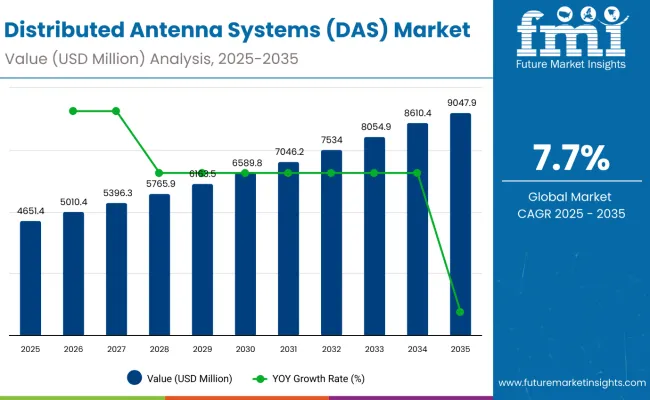
| Attributes | Key Insights |
|---|---|
| Estimated Size, 2025 | USD 4,651.38 million |
| Projected Size, 2035 | USD 9,047.85 million |
| Value-based CAGR (2025 to 2035) | 7.7% |
The global Distributed Antenna System (DAS) market is expanding rapidly, driven by increasing need for increased wireless coverage and capacity in high-density areas such as city downtowns, sports arenas, and large buildings. DAS solutions are crucial for facilitating the widespread use of mobile devices and the surge in data traffic through a distributed network of antennas connected back to a common source to provide enhanced signal strength and coverage.
As 5G networks expand, there is a greater need for advanced DAS infrastructure in order to enable seamless integration with higher frequency bands as well as higher data capacity. Further, industry is aided by efforts to enhance network reliability, improve user experience, and develop next-generation DAS technologies that enable integration with small cells and the Internet of Things (IoT). With telecommunication companies and businesses making mass investments, the global DAS market is likely to see significant growth over the next few years.
Leading companies in the Distributed Antenna Systems (DAS) market are integrating smart technologies such as AI-based signal optimization, real-time analytics, remote monitoring, and 5G-ready capabilities to enhance indoor and outdoor wireless coverage. These technologies are improving network performance in stadiums, airports, hospitals, office complexes, and urban infrastructure.
The below table presents the expected CAGR for the global distributed antenna systems (DAS) market over several semi-annual periods spanning from 2025 to 2035. In the first half H1 of the year from 2025 to 2035, the business is predicted to surge at a CAGR of 7.8%, followed by a slightly higher growth rate of 8.0% in the second half H2 of the same year.
| Particular | Value CAGR |
|---|---|
| H1, 2024 | 7.1% (2024 to 2034) |
| H2, 2024 | 7.5% (2024 to 2034) |
| H1, 2025 | 7.8% (2025 to 2035) |
| H2, 2025 | 8.0% (2025 to 2035) |
Moving into the subsequent period, from H1 2025 to H2 2035, the CAGR is projected to increase slightly to 7.8% in the first half and remain relatively moderate at 8.0% in the second half. In the first half H1 the market witnessed a decrease of 70 BPS while in the second half H2, the market witnessed an increase of 50 BPS.
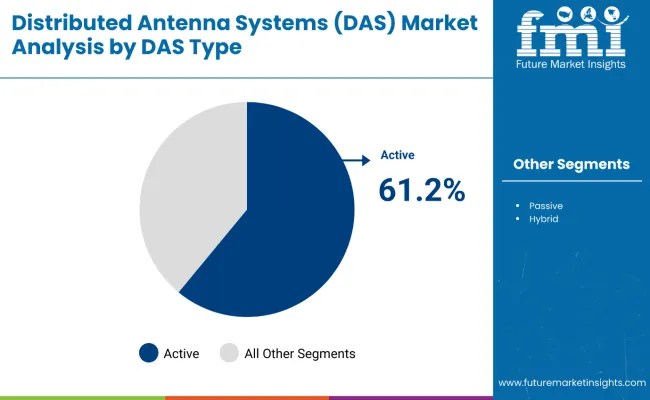
Active distributed antenna systems (Active DAS) are in high demand due to the growing need for reliable and high-capacity wireless communication, especially in large venues like stadiums, airports, hospitals, and commercial buildings.
These systems enhance signal strength, reduce coverage gaps, and support high data traffic by distributing signals more efficiently across multiple antennas. With the rising use of mobile devices, streaming services, and IoT technologies, active DAS offers a scalable solution to meet increasing connectivity demands in both public and private spaces.
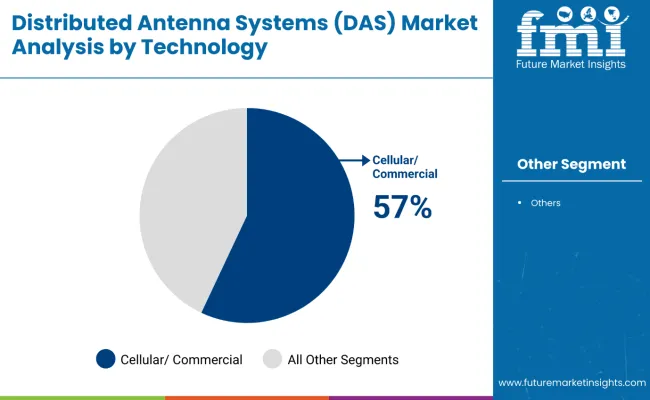
Cellular and commercial Distributed Antenna Systems (DAS) are in high demand due to the growing need for reliable mobile connectivity in large indoor spaces such as office buildings, shopping malls, hotels, and airports.
With the increasing use of smartphones and data-heavy applications, traditional cellular networks often fail to provide consistent coverage indoors. DAS helps solve this issue by distributing cellular signals more effectively throughout a building, improving voice call quality, enhancing data speeds, and ensuring a seamless user experience in high-traffic environments.
Increase in Cellular Connections and Smartphone Penetration.
In the contemporary business landscape, smartphones and internet connectivity has transitioned from being perceived as mere luxuries to indispensable necessities. The proliferation of digital services, ranging from payment platforms to messaging applications, many applications for government services such as tax filings as well as essential communication software, has substantially elevated the reliance on these devices. Notably, the global user base of smartphones has experienced significant growth, escalating from the statistics recorded in 2017. According to Ericsson's findings, the tally of smartphone users surged to an impressive 6.62 billion total users globally in 2022.
Growth of Large Metropolitan Areas
A growing demographic trend is witnessing an increasing influx of individuals choosing major metropolitan cities as their preferred residence. This migration is attributed to the allure of expanded employment opportunities, an elevated standard of living, improved public transportation, and an augmented range of services. As per the OECD classification, a metropolitan area is characterized by a populace surpassing one million inhabitants. Since the turn of the millennium, there has been a discernible uptick in the proportion of individuals opting for densely populated metropolitan locales across diverse global regions.
This surge in urbanization has catalyzed a strategic shift towards advanced technological solutions to sustain reliable internet services within these densely populated urban areas. Among these solutions is DAS, DAS technology stands out as a key infrastructure investment for ensuring seamless and robust internet services in metropolitan areas, primarily due to their small size they can easily be places in densely packed metropolitan areas much easier than it would be to accommodate larger cell phone towers, DAS work in conjunction with cell phones towers and are used to distribute network traffic over a sub region. This adoption of DAS represents a critical factor propelling the DAS market, fueled by the escalating preference of the global population for metropolitan living. As cities strive to accommodate and enhance the connectivity needs of their increasing populations and density.
Integration with Small Cells
Small cells, or diminutive cellular base stations, represent a recent evolution within Distributed Antenna Systems (DAS). Functioning akin to passive DAS, which distribute a source signal, from sources such as cell phone or radio towers using passive components such as coaxial cables.
These innovative solutions are strategically deployed to address network capacity challenges within confined areas, such as high-traffic hotspots or critical zones. Small cells offer a targeted approach to augmenting network coverage and capacity, contributing to a more densely interconnected network infrastructure. Their compact size, as implied by the nomenclature, distinguishes them from traditional DAS components, fostering increased network density. An industry survey conducted by Spectrum Control underscores the significance of small cell systems, with 84% of engineers anticipating their substantial role in advancing DAS capabilities.
Cost and Time Constraints of DAS Deployment
Depending on the requisite functionalities to be incorporated into the DAS, considerations such as the integration of specific frequency ranges, including Very High Frequency (VHF), Ultra High Frequency (UHF), or the 700 to 800 MHz public safety spectrum, may arise. Incorporating VHF/UHF, which spans frequencies of 30 to 300 MHz and 300 MHz to 3 GHz, respectively, introduces heightened complexity and an associated escalation in material costs for the DAS. This cost elevation is further accentuated by contemporary DAS designs that leverage fiber optic cables to ensure high-speed connectivity.
The global Distributed Antenna Systems (DAS) industry recorded a CAGR of 7.7% during the historical period between 2020 and 2024. The growth of Distributed Antenna Systems (DAS) industry share was positive as it reached a value of USD 4,318.83 million in 2024 from USD 3,189.87 million in 2020.
From 2020 to 2024, the global distributed antenna systems (DAS) market promptly growing. This growth happened because more people wanted better network coverage and capacity in cities and businesses. We saw more DAS installations in places like sports arenas, airports, and big buildings.
Looking forward, experts predict faster growth from 2025 to 2035. It is expected the market size to jump to bigger spot. This jump will happen because of 5G networks getting bigger more IoT devices popping up, and cities growing. This prediction shows a strong yearly growth rate. It tells us that DAS will play a big part in building future network systems.
Tier 1 players such as CommScope, Corning Incorporated, TE Connectivity, JMA Wireless, American Tower Corporation, Crown Castle These companies are dominant in the DAS market, known for their extensive product portfolios, large-scale deployments, and significant market influence. They offer comprehensive solutions and have a global reach, catering to major infrastructure projects and high-profile installations.
Tier 2 mainly includes with Boingo Wireless, Cobham Wireless, SOLiD, Anixter Inc, Bird Technologies, Galtronics, Westell Technologies, BTI Wireless, Advanced RF Technologies, Inc. (ADRF), Dali Wireless These firms play a crucial role in the DAS market with strong regional and niche expertise. They provide specialized DAS solutions and cater to specific market segments, including enterprise and public venue installations.
Tier 3 consist of HUBER+SUHNER, G-Wave Solutions, Comba Telecom Systems Holdings Ltd, Comtech Technologies Inc These companies are recognized for their innovative technologies and emerging presence in the market. They often focus on specialized or newer DAS solutions and cater to specific needs within the industry, contributing to the overall market dynamics with niche offerings.
The section below covers the industry analysis for the Distributed Antenna Systems (DAS) market for different countries. The market demand analysis on key countries in several countries of the globe, including USA, Germany, Italy, China and India are provided.
The united states is expected to remains at the forefront in North America, with a value share of 73.9% in 2025. In South Asia & pacific, India is projected to witness a CAGR of 11.1% during the forecasted period.
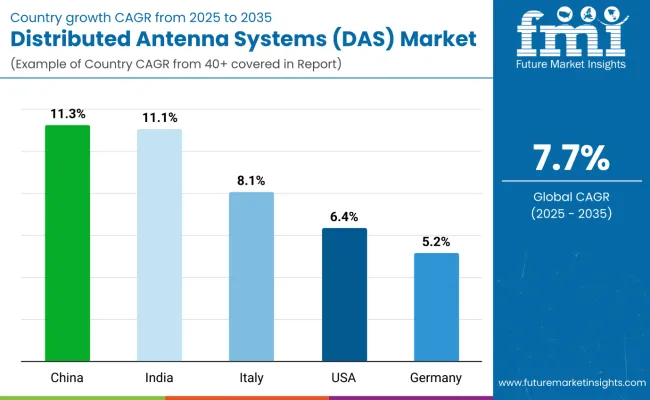
| Country | Value CAGR (2025 to 2035) |
|---|---|
| USA | 6.4% |
| China | 11.3% |
| India | 11.1% |
| Germany | 5.2% |
| Italy | 8.1% |
The market in the united states a upraise in demand for distributed antenna systems (DAS) as the need grows to boost cellular network coverage and capacity. This comes as data use increases and 5G networks expand. The mobile data traffic continuously going up, with the average american national used about 11.2 GB of data each month in 2024. DAS solutions play a key role to ease network congestion and improve connections in busy areas like city centers, stadiums, and airports.
Also, the move to 5G tech calls for more complex and dense network setup, which DAS systems can offer. This helps to roll out fast responsive services.
In China, distributed antenna systems (DAS) have strong sales potential, thanks to the quick growth of 5G networks and more people moving to cities. China leads the world in 5G, with over 2 million 5G base stations set up by early 2024. This makes DAS solutions crucial to meet the need for better network coverage and capacity. The Chinese government's efforts to create smart cities and advance technology add to this need opening up a big market for DAS providers. Forecasts show the DAS market in China will grow fast, with an expected yearly growth rate of about 11.3% over the next ten years.
India has emerging market to adopt distributed antenna systems (DAS). This is because of its fast-growing cities more people using mobile data, and expanding telecom networks. In 2024, India had about 1.2 billion mobile users, with most data use in cities. The government wants to boost digital connections through plans like the National Broadband Mission. This helps DAS systems grow to make networks work better and reach more places.
FMI predicts the Indian DAS market will grow at rapid pace. They expect it to increase by about 11.1% each year for the next five years. This shows that many people want reliable high-capacity network solutions as mobile use and infrastructure keep growing.
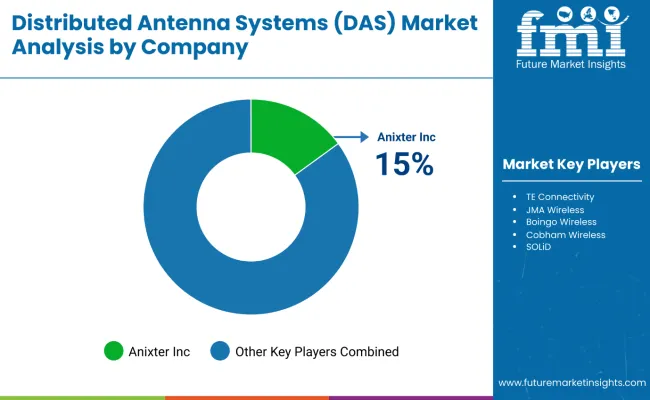
The competitive landscape for the Distributed Antenna Systems (DAS) market is characterized by a diverse array of key players, including industry giants like CommScope, Corning Incorporated, and TE Connectivity, who lead with extensive portfolios and global reach. These leaders dominate with their advanced technological solutions and large-scale deployments.
Additionally, companies such as JMA Wireless, Boingo Wireless, and Cobham Wireless contribute significantly by focusing on specialized DAS solutions and regional market needs. The market also includes up-and-coming players like HUBER+SUHNER and G-Wave Solutions known for their groundbreaking approaches and specialized uses. This competitive scene is characterized by ongoing tech breakthroughs strategic team-ups, and company buyouts. These moves aim to boost capabilities and grab more of the market showing an energetic and fast-changing industry environment.
On the basis of DAS type, the market is classified into active distributed antenna systems (DAS), passive distributed antenna systems (DAS) and hybrid distributed antenna systems (DAS).
In terms of technology, the market is classified into cellular/commercial distributed antenna systems and public safety distributed antenna systems.
With respect to application, the market is classified into commercial, industrial, public venues, and residential buildings.
Key countries of North America, Latin America, Western Europe, Eastern Europe, East Asia, South Asia & pacific, Middle East and Africa (MEA) have been covered in the report.
The global Distributed Antenna Systems (DAS) industry is projected to witness CAGR of 7.7% between 2025 and 2035.
The global Distributed Antenna Systems (DAS) industry stood at USD 4,052.96 million in 2024.
The global Distributed Antenna Systems (DAS) industry is anticipated to reach USD 8,400.98 million by 2035 end.
East Asia is set to record the highest CAGR of 10.5% in the assessment period.
The key players operating in the global Distributed Antenna Systems (DAS) industry include CommScope, Corning Incorporated, TE Connectivity, JMA Wireless, Boingo Wireless, Cobham Wireless. and others.






Our Research Products

The "Full Research Suite" delivers actionable market intel, deep dives on markets or technologies, so clients act faster, cut risk, and unlock growth.

The Leaderboard benchmarks and ranks top vendors, classifying them as Established Leaders, Leading Challengers, or Disruptors & Challengers.

Locates where complements amplify value and substitutes erode it, forecasting net impact by horizon

We deliver granular, decision-grade intel: market sizing, 5-year forecasts, pricing, adoption, usage, revenue, and operational KPIs—plus competitor tracking, regulation, and value chains—across 60 countries broadly.

Spot the shifts before they hit your P&L. We track inflection points, adoption curves, pricing moves, and ecosystem plays to show where demand is heading, why it is changing, and what to do next across high-growth markets and disruptive tech

Real-time reads of user behavior. We track shifting priorities, perceptions of today’s and next-gen services, and provider experience, then pace how fast tech moves from trial to adoption, blending buyer, consumer, and channel inputs with social signals (#WhySwitch, #UX).

Partner with our analyst team to build a custom report designed around your business priorities. From analysing market trends to assessing competitors or crafting bespoke datasets, we tailor insights to your needs.
Supplier Intelligence
Discovery & Profiling
Capacity & Footprint
Performance & Risk
Compliance & Governance
Commercial Readiness
Who Supplies Whom
Scorecards & Shortlists
Playbooks & Docs
Category Intelligence
Definition & Scope
Demand & Use Cases
Cost Drivers
Market Structure
Supply Chain Map
Trade & Policy
Operating Norms
Deliverables
Buyer Intelligence
Account Basics
Spend & Scope
Procurement Model
Vendor Requirements
Terms & Policies
Entry Strategy
Pain Points & Triggers
Outputs
Pricing Analysis
Benchmarks
Trends
Should-Cost
Indexation
Landed Cost
Commercial Terms
Deliverables
Brand Analysis
Positioning & Value Prop
Share & Presence
Customer Evidence
Go-to-Market
Digital & Reputation
Compliance & Trust
KPIs & Gaps
Outputs
Full Research Suite comprises of:
Market outlook & trends analysis
Interviews & case studies
Strategic recommendations
Vendor profiles & capabilities analysis
5-year forecasts
8 regions and 60+ country-level data splits
Market segment data splits
12 months of continuous data updates
DELIVERED AS:
PDF EXCEL ONLINE
Understanding Market Share Trends in Distributed Antenna Systems (DAS)
Distributed Fiber Optic Sensor Market Analysis - Size, Share, and Forecast Outlook 2025 to 2035
Distributed Cloud Market
Distributed Control System Market
Distributed Temperature Sensing Systems Market Size and Share Forecast Outlook 2025 to 2035
United States Distributed Antenna System (DAS) Market Growth – Trends & Forecast 2024-2034
Antenna Switch Module Market Size and Share Forecast Outlook 2025 to 2035
Antenna, Transducer, and Radome (ATR) Market Size and Share Forecast Outlook 2025 to 2035
Chip Antenna Market
RFID Antenna Market
Train Antenna Market Size and Share Forecast Outlook 2025 to 2035
Printed Antenna Market Size and Share Forecast Outlook 2025 to 2035
RAIN Tag Antennas Market Size and Share Forecast Outlook 2025 to 2035
Wireless Antenna Market Size and Share Forecast Outlook 2025 to 2035
Aircraft Antenna Market
Satellite Antenna Market
Microwave Antenna Market
Automotive Antenna Module Market Size and Share Forecast Outlook 2025 to 2035
Flat Panel Antenna Market Size and Share Forecast Outlook 2025 to 2035
Commercial Antennas Market

Thank you!
You will receive an email from our Business Development Manager. Please be sure to check your SPAM/JUNK folder too.
Chat With
MaRIA